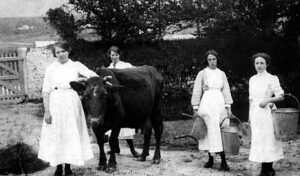 The Dairy School at Blackwater in 1916 – local girl Olive James on the left.
The Dairy School at Blackwater in 1916 – local girl Olive James on the left.
Dairy Schools were once an important part of rural life: they fulfilled a need and were gone by the 1930s. Considering that, perhaps it is not surprising that few have even heard of their existence.
The Technical Instruction Act of 1889 had a major effect on engineering and agriculture as it required vocational teaching and it seems likely that Dairy Schools were a direct result of this legislation.
It was deemed necessary that girls be taught the art of making dairy products to help farmers make the best use of their produce. Classes were set up across the country and it is probable that the need to maximise food production during conflicts added to the urgency of their creation. No doubt it was the farmer’s wives and daughters who were first targeted.
However, it seems that progress was slow in Cornwall – probably due more to a reluctance on the part of the authorities than an unwillingness to partake by potential participants.
This was at a time before milk collection was undertaken by the Milk Marketing Board, when farmers delivered milk direct to their customers.
Christopher Riddle, in his book So Useful an Undertaking, about the Royal Cornwall Show, wrote, “In a meeting of the members in 1900, the hope was raised that the C C [County Council] would see fit to establish a Dairy School, as had been done in various other counties”.
Clearly, however, Cornwall Council did get their act together as in the same book he includes an item from 1908 which states, “Mention was made of the important work being undertaken by the C C Dairy School, who, with Miss Nicholas’ capable instruction, was of great value to the dairy farmers of the county”.
The Cornish Telegraph of Thursday the 25th of August 1887 included this report about a possible line of funding for the initiative:
DAIRY SCHOOLS. In the House of Commons last night Sir Wm. Hart Dyke informed Mr Walter McLaren that the Government would appoint a small committee to consider the propriety of making grants to dairy schools.
The Royal Cornwall Gazette of Thursday the 21st June 1906 included this report referring to the progress being made, albeit with a heavy dose of deference:
There was one point about the dairy section this year which should commend itself to everybody. It is not long ago that I heard it said that farmers’ daughters were getting so proficient in pianoforte playing, and tennis, and other very excellent diversions, that they would not deign soil their hands in the dairy. I am glad to think that, however much that reproach may have been true a few years ago, it is gradually passing away. In the recent dairy schools in West Cornwall we have seen the wives and daughters of county gentlemen and landlords competing in friendly rivalry with farmers’ wives and daughters as well as their own dairy maids. May I say that these ladies, apart from the splendid examples they have set both in the dairy schools and at the Exhibition contests, have covered themselves with honour. If I mentioned one lady it would be Mrs John Williams, of Scorrier House, who came out highest in the class in which she competed. The wife of a country squire, a big landlord, and himself a practical farmer and breeder of both horses and cattle. Mrs Williams’ conduct is worthy of the highest praise and emulation. Apart from the credit of knowing how to correctly do the work that is being done in one’s own establishment. it is surely a great advantage to one’s own servants to have at their head a thoroughly practical mistress, who is not open to carping criticism and fault-finding for fault-finding’s sake, but able herself, as an expert in that work, point out where the work of her employees fail, and how it can be improved. If that were the experience in every home, agricultural or otherwise, there is no telling how much waste could be prevented, and how much that is valuable could be conserved. Nor how far it would go to solve the domestic servant bugbear.
The Royal Cornwall Gazette of Thursday the 19th April 1906 reports on a proposed Dairy School at Devoran:
Cornwall and Dairy Schools – In Devoran Schoolroom on Saturday a meeting was held to make arrangements for starting a Dairy School at Perranwharf under the auspices of the Cornwall County Council. The Hon. John Boscawen was voted to the chair, and in opening the proceedings, referred to the improved methods of manufacture used in the County Dairy School, and remarked on the very great improvement that had taken place during recent years in consequence of the instruction given in the competitions at the Royal Cornwall Agricultural Association meetings each year. At Newquay last year the judges remarked that that was the best they had ever seen. A committee, representative of the whole district, was formed, with Mr Edwards. of Perran-ar-worthal as secretary, and it was decided that there should be a demonstration of dairy work to-day (Thursday), and that on Friday, a ten-day course of lessons should commence.
There was clearly good work going on at Camborne as can be seen from this Cornubian and Redruth Times report of Thursday the 16th of December 1909:
The Clerk reported that the Instructor of the Camborne Dairy School thought the attendance, considering the weather, had been exceedingly satisfactory. There were ten adult students in the morning, the same number in the afternoon, and also five elementary school children in the morning.
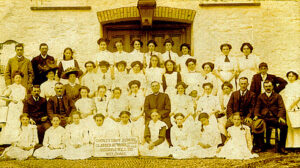 Dairy School at Blackwater in 1910 – in front of Blackwater Wesleyan Chapel
Dairy School at Blackwater in 1910 – in front of Blackwater Wesleyan Chapel
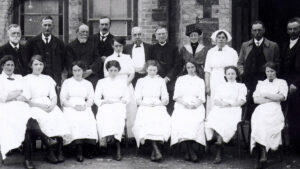 Attendees at the Blackwater Dairy School with the good and the great behind them
Attendees at the Blackwater Dairy School with the good and the great behind them
Mrs Olive Grace Glasson (née James) was born in July 1899 and lived at Mount Pleasant Farm at the top of Carnhot, Blackwater. She attended the County Dairy School held at the Passmore Edwards Institute, Blackwater. Margaret Kent (née Glasson) of Three Burrows, Olive’s daughter, provided these certificates gained by her mother.
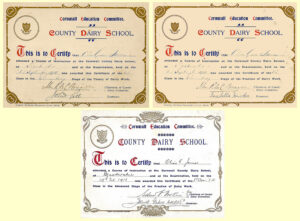
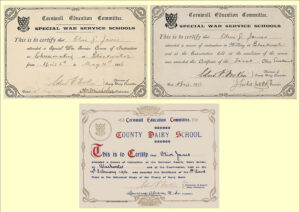
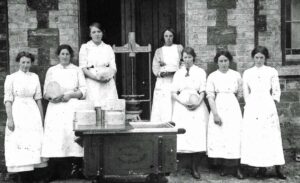 The Dairy School at Blackwater in 1916 in front of the John Passmore Edwards Institute. Olive James is third left.
The Dairy School at Blackwater in 1916 in front of the John Passmore Edwards Institute. Olive James is third left.
Miss Nicholas was clearly involved for many years and Doris Trethewy (née Mugford) of Blackwater remembers her from when she attended a dairy school at Perranporth in the early 1930s. It was held in the old Memorial Hall and provided training in a variety of dairy skills. Doris, who was then in her early teens, recalls the sessions lasting all day, with tuition, including written elements, spread over a month. She recalled the butter-making churns and, what she thinks were called, butter workers-tables where the moisture was squeezed out. Miss Nicholas and her team travelled the area providing classes where needed and Doris thinks they were discontinued soon after she attended her course.
The Cornish Guardian of Thursday the 9th of April 1931 referred to the science of butter-making and the need for a Travelling Dairy School:
Scientific Butter-Making: A person who has spent a good many years in the grimy industrial region of the north might, as one has done recently, may express surprise that a county so famed for its dairy produce as Cornwall should need a Travelling Dairy School. But the distribution of prizes and certificates to students who had attended, and profited by studying at, the school at Padstow, shows that our Cornish dairy people are still not satisfied with their achievements. The effect of these dairy schools is to improve the butter made in Cornwall; and, as in other commodities, the best is always, in the long run, the cheapest. Butter-making, one happens to know, does not always receive the serious attention to scrupulous cleanliness and scientific churning that is demanded. The “dairymaid,” who is often the farmer’s wife – often has a hundred other things to think about and attend to while making butter. Therein lies the problem. The value of the Travelling Dairy School is that it shows how the best butter should be produced and in the best possible conditions. One may justly hope that the visit of the School to Padstow will leave, as a memorial (so to speak), a permanently improved butter supply for that part of Cornwall; and let us express the hope of Major Johnstone that a team from Padstow will bring the shield for butter-making back from the Royal Cornwall Show.
Butter-making is less common these days and in 2007, my wife, Suzanne (Sue) Mansell recalled her mother, Mrs Gwendoline Roberts, making butter at Rose-in-Valley Farm, Mithian Downs, (now Treleaver Farm) from 1949 and from 1954 at Wheal Davey Farm, Wheal Butson. Not having been involved in agriculture before her marriage, it is doubtful that Gwen attended a Dairy School.
Sue wrote, “She scalded the milk in a large enamel bowl on the stove until a crust had formed which she skimmed off and placed in a bowl. The cream was then kneaded until it thickened and was then formed into blocks using pats. Finally, she pressed her stamp into the surface of the butter blocks to show its origin. At Rose-in-Valley Farm the butter was placed in the open end of an old mine adit to cool. The adit was in our garden and drained Wheal Davey Mine which was on the farm which we later owned.”
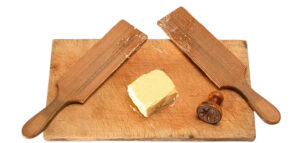
The butter pats and stamp
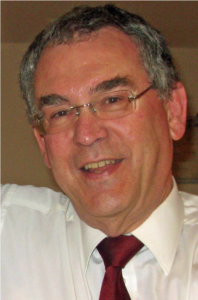
Tony Mansell is the author of several books on aspects of Cornish history. In 2011 he was made a Bardh Kernow (Cornish Bard) for his writing and research, taking the name of Skrifer Istori. He has a wide interest in Cornish history, is a researcher with the Cornish National Music Archive and a sub-editor with Cornish Story.
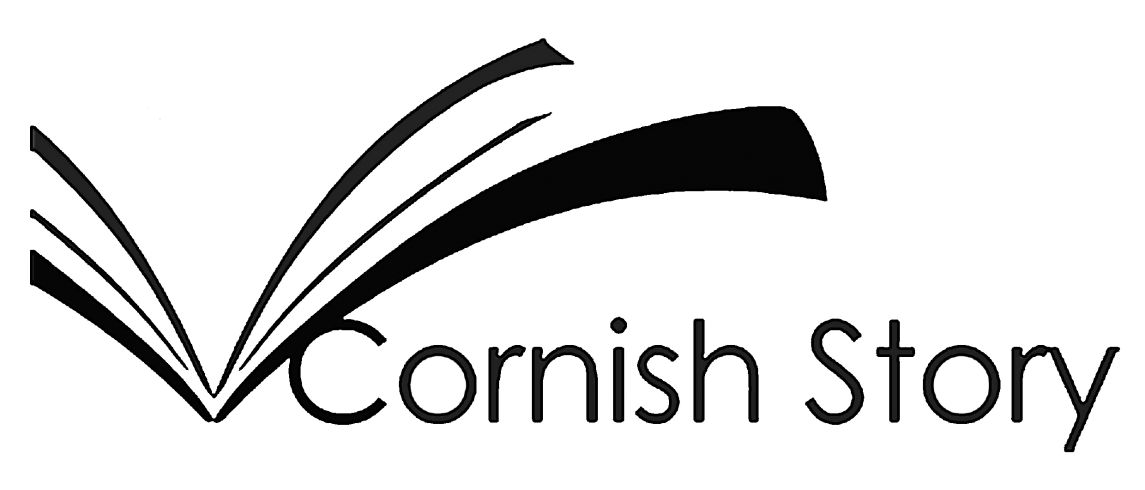
A very interesting article. I have always known about Dairy Schools from my Mum but did not know about their origins or that they were set up all over the county mainly in church halls etc. My Mum nor her sisters attended one but were taught how to make butter and cream and dressmaking by their Mum and taught how to milk cows by their Dad.
It was interesting to read the quote ‘farmers’ daughters were getting so proficient in pianoforte playing, and tennis, and other very excellent diversions, that they would not deign soil their hands in the dairy.’
I doubt my Aunts and had any time or money for such pastimes as did any daughters of small holders in Cornwall or anywhere else.